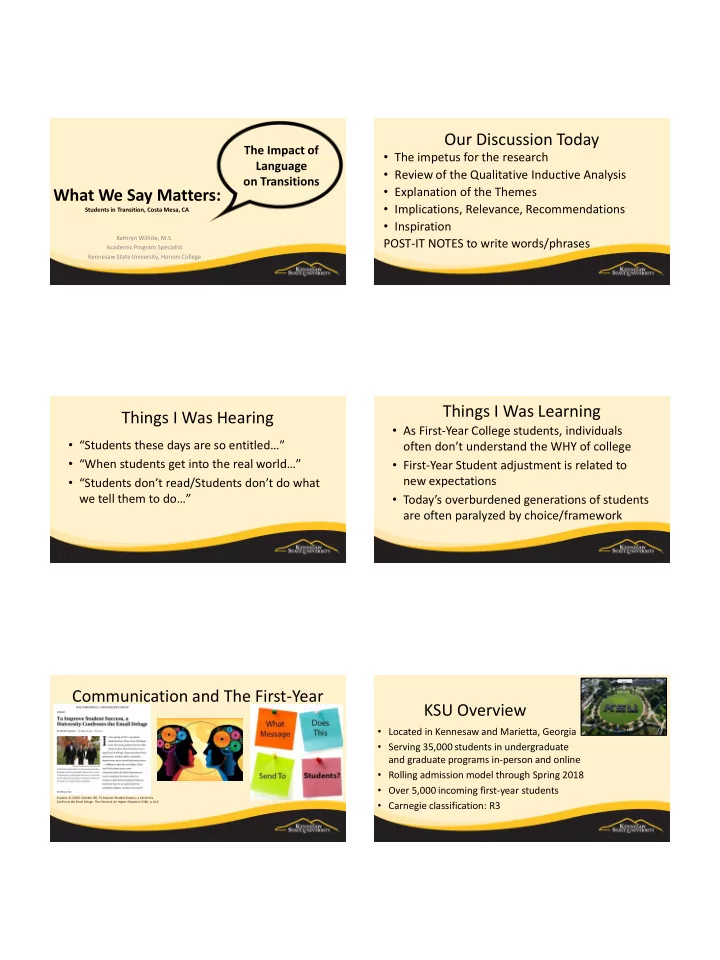

Our Discussion Today The Impact of • The impetus for the research Language • Review of the Qualitative Inductive Analysis on Transitions • Explanation of the Themes What We Say Matters: • Implications, Relevance, Recommendations Students in Transition, Costa Mesa, CA • Inspiration Kathryn Wilhite, M.S. POST-IT NOTES to write words/phrases Academic Program Specialist Kennesaw State University, Honors College Things I Was Learning Things I Was Hearing • As First-Year College students, individuals • “Students these days are so entitled…” often don’t understand the WHY of college • “When students get into the real world…” • First-Year Student adjustment is related to • “Students don’t read/Students don’t do what new expectations • Today’s overburdened generations of students we tell them to do…” are often paralyzed by choice/framework Communication and The First-Year KSU Overview • Located in Kennesaw and Marietta, Georgia • Serving 35,000 students in undergraduate and graduate programs in-person and online • Rolling admission model through Spring 2018 • Over 5,000 incoming first-year students Supiano, B. (2016, October 20). To Improve Student Success, a University • Carnegie classification: R3 Confronts the Email Deluge. The Chronicle for Higher Education 63 (9), p. A10.
• Mandatory First-Year Seminar Research Questions Reputation for serving for students with under 15 First-Year Students • 13 years ranked as on of US credit hours 1. What are the communication pieces, what do they say, who is responsible for News & World Report’s best creating and delivering the message, and on what time line? first-year experiences • Learning Communities • In 2010, First-Year an 2. Is the institution creating a relationship via the communications they send to • First-Year Orientation is Transition Studies received the first-year students? University System of Georgia required 3. Is the institution using language meant to include first-year students in Program Excellence Award, the system’s highest honor discourse? • Extended Orientation available • In 2015 the institution 4. Is the institution communicating with first-year students in ways that empower launched the first-ever them to be successful? Master’s degree with an emphasis in First-Year Studies Analysis A Tool to Measure Empowerment 10 Categories on the Rubric Recurring Words and Phrases Blending Maryellen Weimer’s strategies for • Audience appropriate language • Counted and charted for • Communication intent is clear empowering students in the classroom and frequency • Language choice • Reviewed for consistency in Michel Foucault’s perspectives on • Language balance definitions • Timing empowerment language: • Reviewed for recurring messages • Discourse • Communication experience Rubric for Evaluating Language in • Language provides choice • Communications to Incoming FY Students Language invokes participation • Language provides motivation Themes Themes 1. Language Balance is found through 2. Ignoring timing and refusing articulation of the meaning of the terms as further discourse builds process related to the student; over relationship;
Themes Themes 4. When choice includes 3. Word choice matters participation and within each document motivation the and influences the opportunity exists for interpretation of other empowerment to thrive. documents; Themes 5. Emerging theme: Communication communication experience matters; Experience Implications Why Does it Matter? • The validated rubric can be used to craft empowering messages ENVIRONMENT • The validated rubric can be used to design intentional communication experiences • Another motivator to work across institutional divisions to agree on language choices INPUT OUTCOMES • Institutional cultural shifts toward empowerment Astin’s I-E-O Model (1993)
Recommendations What Can You Do? • Communication Task Force • Word Matrices and Institutional Lexicons • First-Year Student • Motivate students through decision making • Innovate experiences with technology • Build relationships with students • Define the environment and the student within it using language balance What If… Questions? Contact info: Kathryn Wilhite, KSU Honors College kwilhit5@kennesaw.edu or 470.578.4779 Thank you! Safe travels!
Recommend
More recommend